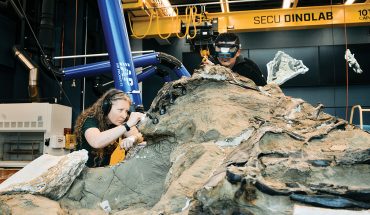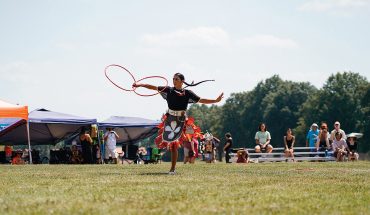
courtesy Adam Jones
by Adam W. Jones
The temptation was just too great. Fallon Creek ran for a good quarter mile along our walk to and from Myrtle Underwood Elementary, and the gurgling water called to us daily. It turned a 15-minute walk home into an hour-long adventure: We’d find salamanders and crawdads, test the buoyancy of our text books, and arrive home wet and dirty, smiling wide.
“Out, out, out!” my mother would shout. “Out of my house with those filthy clothes.” She would give us a snack on the back porch, usually a Dixie Cup of Jell-O with cut fruit suspended in mid-tumble. “Eat your snack, then go play until dinner time.”
My best friend Jamie and the other neighborhood boys and I would meet up at the Rabbit Field (the extra-large backyard of an elderly neighbor) to play football, or whatever sport was in season at the time. Or we’d go down to Fallon Park a few blocks away and get wet in the creek or play Army in the woods. We would arrive back home even dirtier than before to get ready for dinner. My family would sit around the dining table, eat a hearty home-cooked meal, and share our day’s adventures. My parents were good listeners, and we five children were good talkers. It was a real skill just to get a word in edgewise with such a large family.
I can see now, looking back, that my childhood adventures sparked my creativity. Of course, it helped to have parents and siblings who allowed it to flourish, and an extended family full of storytellers. They all invited the young ones to tell a tale, sing a song, or act out a play at the family beach house in the summertime, which was always a flurry of activity. All of the mothers would bring the young children down for the summer; fathers and older cousins visited on the weekends. We didn’t have a TV there until the late 1990s. We didn’t need one.
But I never thought about creative writing until my seventh grade year at Ravenscroft when my English teacher, Ms. White, asked us to write a haiku poem. Mine was titled Lassiter Mill, and when it received a solid “A,” she submitted it to a national poetry contest, something I never would have had the confidence or initiative to do on my own. It won. Ms. White was more excited than I was, and the recognition gave me the boost I needed. Good teachers make a real impact on their students, and I’ve never forgotten it. Recently, I had lunch with Ms. White after she received word that my novel Fate Ball had been published. When she said she was “so proud” of me, it meant more than any five-star review; even after all these years she is still making an impact.
Lassiter Mill
by Adam W. Jones (12 years old)
Rapids running strong,
Bass and Bream jumping about,
Life ends with a hook.
By ninth grade, I was writing a feature for the school paper, acting in school plays, playing sports, and carving out my own path through high school. The confidence I gained during those formative years led to my decision to take a gap year after high school (before they called it a gap year). My sojourn across fifteen countries in Europe and North Africa opened my eyes to the world around me. I learned there was more out there than my little world inside the Beltline, though I eventually returned to the place I loved most – the South – and graduated from Carolina with a degree in journalism.
All of it has shaped my writing. I write what I know and what I feel. Look hard enough and a reader can find several Raleigh landmarks and references in Fate Ball, though places and names were changed, as they say, to protect the innocent. At the launch party for Fate Ball, I spoke of not thinking of myself as a writer. Somehow all the confidence I had as a person didn’t translate to confidence in my creative abilities. My friend John Lennox raised his hand during the Q&A. “How many books will it take before you realize you’re a writer?” he asked. “You’re right,” I told him, “I’m a writer.” John passed away a few months later, and I thank him daily for helping me believe in myself.
I am who I am because of my family and friends. I am who I am because I am a Raleighite. I am who I am because I’m a North Carolinian and a Southerner. I wouldn’t have it any other way.
Excerpt from Fate Ball

by Adam W. Jones
“She only wants to see you,” said Mrs. Dubose, dabbing a tear with a silk handkerchief. “I’m so grateful to you for coming.” She reached out and took his hand, then pulled him close and held on tight. “You’re a good man, Able Curran,” she whispered as she squeezed him tightly.
Mr. Dubose walked over and touched his shoulder. It was the most affection Able had witnessed from him in ten years.
“I don’t know who else would fly clear across the country for someone like Ava, but I sure am grateful,” he said in a gentlemanly Southern drawl. “We’ve done all we know to do, but it’s just never been enough.”
He paused for a moment as reality set in. “What else can I do to save my baby girl?” he said, now getting choked up. “Tell me, Able, after four rehabs, private therapy, trying to buy her sobriety with condos and cars. What else can I do?”
Mr. Dubose quickly turned and walked a few steps down the stark corridor. He slowly wiped his eyes with both hands and ran his fingers through his thick, graying hair. Mrs. Dubose went to console her husband. Their eyes locked on each other for a moment, then they reached out to one another and held each other for what seemed like forever. Virtual strangers for the last several years, the Duboses recaptured their love for one another in the midst of tragedy. Their struggle to save Ava’s life made their marriage troubles seem so petty. Once they came to that realization, their love for one another began to blossom again. They needed someone to lean on and, once again, they were there for each other.
Able watched Ava’s parents, who had tried so hard to help their daughter, at a loss for what to do next.
“She’ll be all right,” Able said, trying to give them a ray of hope. “I think this accident may be the wake-up call that she needs. Don’t worry, she’ll get through this, we’ll all get through this.”



